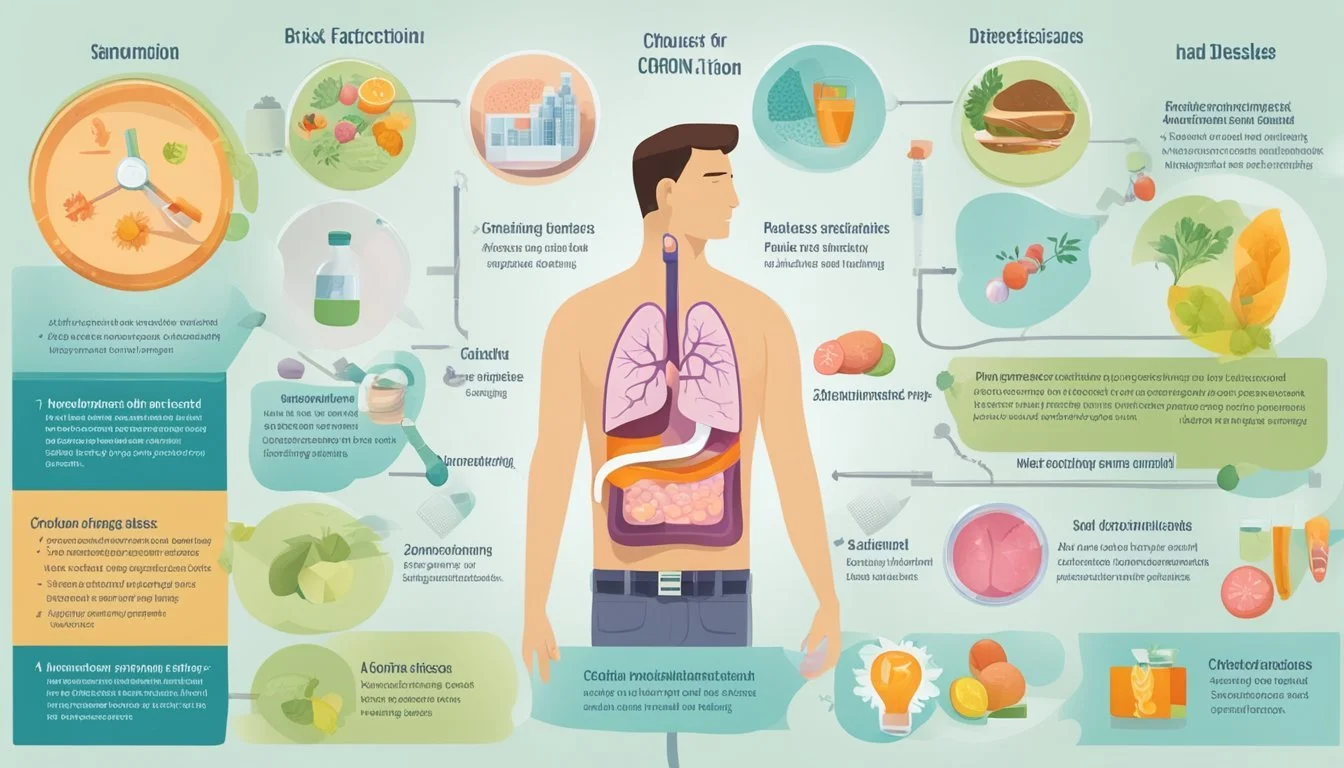Crohn's Disease
Understanding Risk Factors, Triggers and Prevention
Discover > Health Conditions > Crohn’s Disease
Crohn's disease, a chronic autoimmune condition, falls under the umbrella of inflammatory bowel disease (IBD) and primarily affects the digestive tract. It can lead to symptoms like abdominal pain, chronic diarrhea, weight loss, and fatigue as the immune system struggles. Although the exact cause of Crohn's disease is not completely understood, it is believed to result from a complex interplay between genetic medical history, environmental, and lifestyle factors. Lifestyle choices do not cause Crohn's disease, but they can influence its onset and exacerbate its symptoms.
Certain lifestyle factors have been associated with an increased likelihood of developing Crohn's disease or making its symptoms worse. These include smoking, which is the most significant modifiable risk factor, as it not only increases the risk of developing the disease but can also lead to more severe disease progression. Dietary patterns, particularly those high in refined sugars and fats, are also thought to impact the incidence and course of Crohn's. Furthermore, nonsteroidal anti-inflammatory drugs (NSAIDs) are recognized for their potential to irritate the bowel lining, thus potentially worsening disease activity in susceptible individuals.
Managing these risks through lifestyle modifications is important to living with Crohn's disease. Health professionals often emphasize the benefits of a balanced diet, cessation of smoking, and careful use of medications. By identifying and addressing these contributing factors, individuals with Crohn's can work towards maintaining remission and improving their quality of life.
Understanding Inflammatory Bowel Disease
Crohn's Disease is a type of Inflammatory Bowel Disease (IBD) marked by chronic inflammation of the digestive tract. This inflammation can lead to various symptoms and complications, the understanding of which is essential for managing the condition effectively.
Definition and Overview
Crohn's Disease is a chronic autoimmune condition that targets the digestive system. It can affect any part of the digestive tract, from the mouth to the anus, but most commonly occurs in the small intestine and colon.
As an Inflammatory Bowel Disease, Crohn's disease is often grouped with ulcerative colitis; however, the areas affected and the patterns of inflammation differ.
Nature of the disease: Chronic Inflammation
Primary areas affected: Small intestine and colon
Crohn's disease is considered a functional gastrointestinal disease that many can live with but sometimes surgical intervention is required if the inflammatory bowel disease's symptoms worsen or lead to colon cancer.
Signs and Symptoms of Crohn's Disease Diagnosed
The symptoms of Crohn's Disease may vary from person to person and can range from mild to severe, often with periods of active illness followed by times of remission. The most common symptoms include:
Diarrhea: Persistent and at times severe
Abdominal Pain: Cramping and discomfort
Irregular Bowel Habits: Periods of constipation
Weight Loss: Due to reduced appetite and malabsorption
Fatigue: Common due to the body's energy directed towards immune response and inflammation
Anemia: Can occur as a result of nutrient malabsorption
Fever: May arise during inflammatory episodes
The chronicity of symptoms of Crohn's disease and the potential for serious complications underscore the significance of early diagnosis and management.
The Role of the Immune System
The immune system's response plays a central role in Crohn's Disease. Although the precise cause of this autoimmune condition is unknown, it's clear that an overly active immune response leads to inflammation that does not subside, causing damage to the gastrointestinal tract.
Immune Response: Abnormal and persistent
Resultant Condition: Chronic inflammation, leading to tissue damage
By recognizing the involvement of the immune system in Crohn's disease, treatments often focus on immunosuppression to reduce the inflammatory response and manage symptoms.
Risk Factors and Causes
Crohn's disease is a complex condition with multiple contributing factors family history plays a part but so does the lifestyle and environment of the individual. Understanding these factors can help manage and potentially reduce the risk of developing the disease.
Genetic Factors
Genetics play a significant role in the likelihood of whether or not you develop Crohn's disease. Individuals with a first-degree relative with an inflammatory bowel disease have an increased risk.
Specific genes have also been linked to Crohn's disease, but a direct cause-and-effect mechanism has not been fully established.
Environmental Influences
Geographical location can influence risk, with higher prevalence rates in North America and Western Europe suggesting environmental factors are at play. Studies suggest that urban living and industrial environments may contribute to risk, although pinpointing specific environmental causes is challenging.
Lifestyle and Dietary Habits
Diet and lifestyle choices are frequently scrutinized with Crohn's disease. Although no specific food has been proven to cause Crohn's disease, certain diets and components like caffeine may exacerbate symptoms. Many Crohn's sufferers also present with celiac disease.
It is important to note that while stress and diet might affect symptoms, they do not cause Crohn's disease.
Identifying Lifestyle-Related Risks
The development and exacerbation of Crohn's disease can be influenced by certain lifestyle choices. Understanding the pivotal role that factors such as smoking, diet, and the use of certain medications play in managing Crohn's disease is essential.
Smoking and Crohn's Disease
Smoking is a well-established risk factor for the development and progression of Crohn's disease. It can increase the severity of symptoms and lead to a higher rate of relapses and surgeries.
The exact mechanism is not fully understood, but smoking is believed to affect the immune response and induce mucosal inflammation, contributing to the complications of the disease.
Dietary Impacts
What they eat can affect individuals with Crohn's disease in varied ways. Although no specific diet causes or cures the disease, certain foods may trigger symptoms or flares in some patients.
Diets high in refined foods, and certain carbohydrates, and low in fruits and vegetables may aggravate Crohn's disease as they contribute to increased inflammation making symptoms worse.
A well-balanced diet tailored to the individual's tolerances can help in managing symptoms.
NSAIDs and Inflammation
Nonsteroidal anti-inflammatory drugs (NSAIDs) such as ibuprofen and naproxen can exacerbate Crohn's disease symptoms by impairing the gastrointestinal tract's ability to protect and heal itself, potentially leading to flares of the disease.
Patients are generally advised to use alternative pain relief methods, like acetaminophen, which do not have the same inflammatory response.
Crohn's Diagnosis and Monitoring
Diagnosing Crohn's Disease involves a combination of medical procedures to identify the presence and monitor the progression of the condition. Early and accurate diagnosis can significantly affect management and treatment strategies.
Diagnostic Procedures
Colonoscopy
A colonoscopy is a primary diagnostic tool for Crohn's Disease. It allows direct evaluation of the colon and terminal ileum, allowing doctors to check for rectal bleeding, and enables tissue biopsies for histopathological analysis.
CT Scans and MRI tests provide detailed images of the bowel. A CT scan helps identify complications, while an MRI is particularly useful for assessing fistulas around the anal canal.
Capsule Endoscopy can be used when a standard endoscopy does not provide enough information. This involves swallowing a small capsule with a camera that takes images as it travels through the digestive tract.
Blood Tests can't diagnose Crohn's disease directly but can show signs of inflammation or anemia.
Epidemiological Factors
Age and Ethnicity
Age: Crohn's Disease can occur at any age, but it is more prevalent among adolescents and young adults.
Ethnicity: Certain ethnic groups, such as Ashkenazi Jews, have a higher risk of the disease.
Epidemiological studies suggest various environmental factors, like smoking and diet, play a role but genetics are also a significant component of risk.
Knowledge of prevalence and demographics helps physicians identify those at higher risk and might influence the monitoring frequency.
Managing Developing Crohn's Disease
Crohn's Disease management involves a multifaceted approach that includes medical therapies, lifestyle adjustments, and ongoing vigilance to sustain remission and control flare-ups.
Medical and Surgical Treatments
For immediate symptom relief, corticosteroids are often prescribed, but due to side effects, they are not for long-term use.
Anti-TNF biologics, a class of medications, target specific components of the immune system to reduce inflammation and maintain remission. When medications fail to control symptoms, surgery may be necessary to remove affected sections of the digestive tract.
Lifestyle and Home Remedies
Diet: Individuals with Crohn's Disease often find that certain foods can exacerbate their symptoms. While there is no one-size-fits-all diet, it is generally recommended to:
Avoid spicy foods, (What wine goes well with spicy food?) dairy, and high-fiber foods during flare-ups
Eat small, frequent meals
Quitting smoking is crucial as it exacerbates Crohn's Disease. Stress reduction techniques, such as meditation and yoga, are also beneficial in managing symptoms.
Weight loss has also been proven to be beneficial and can help prevent other digestive and kidney diseases.
Ongoing Management
Maintaining mental health is an important aspect of managing Crohn's Disease. Regular consultations with healthcare providers for medication adjustments and monitoring of symptoms are important. Patients should watch for symptoms of flare-ups to adjust treatments promptly, aiming for sustained remission.
Complications and Comorbidities
Crohn's Disease is characterized by inflammation of the gastrointestinal tract, which not only predisposes individuals to a range of complications but also to various related conditions that can affect overall health and quality of life.
Potential Complications
Infections: Individuals with Crohn’s Disease can experience frequent infections due to the compromised integrity of the intestinal wall and the potential for immunosuppressive treatments that increase susceptibility to pathogens.
Fistula: An abnormal connection that can develop between the intestine and other organs, including the skin, causing severe discomfort and requiring surgical intervention.
Bowel Obstruction: Scar tissue from chronic inflammation may narrow the small and large intestine leading to obstruction that often manifests with severe abdominal pain and bloating.
Colon Cancer: Continuing inflammation in the colon places those with Crohn’s at a greater risk for developing colorectal cancer, necessitating regular screening.
Related Conditions
Arthritis: Inflammatory arthritis is a common extra-intestinal manifestation, causing joint pain and stiffness that can significantly impact mobility.
Osteoporosis: The combination of chronic inflammation and corticosteroid use in treatment can lead to bone density loss, increasing the risk for osteoporosis.
Skin Ulcers and Eye Problems: Inflammation can result in conditions such as skin ulcers and eye issues, such as uveitis, with varying degrees of severity.
Liver Disease: In some cases, liver function may be affected and liver disease could be triggered, presenting additional challenges for those managing Crohn's Disease.
Kidney diseases: Crohn's disease affects hydration levels and absorption and can lead to complications in the kidneys.
Those with a family history of any of the above have an increased risk of developing inflammatory bowel diseases.
Conclusion
There is no cure for Crohn's disease because it is an abnormal immune response that attacks healthy cells in the digestive tract but the pain can be managed effectively through lifestyle modifications and medical treatment to relieve symptoms.
The research underscores the link between daily habits and the progression of inflammatory bowel conditions. Specifically, smoking and obesity emerge as tangible risk factors that individuals can address to potentially mitigate disease impact.
Lifestyle Modifications:
Smoking Cessation: Non-smokers have a lower incidence of disease flares.
Dietary Changes: Emphasis on whole foods may ease symptoms.
Physical Activity and Weight Loss: Regular exercise is associated with reduced complications.
Patients with severe Crohn's Disease are advised to make well-informed decisions regarding their health. They should engage with healthcare professionals to devise a personalized plan that includes the following:
Routine Evaluations: Monitoring disease progression is vital.
Nutritional Guidance: Working with dietitians can help tailor dietary choices.
Psychosocial Support: Mental health is integral to managing chronic illness.
Cognizant of individual variances, healthcare providers recommend lifestyle interventions as part of a comprehensive management strategy. Embracing these changes can improve health outcomes and enhance the quality of life for individuals with Crohn's Disease.



